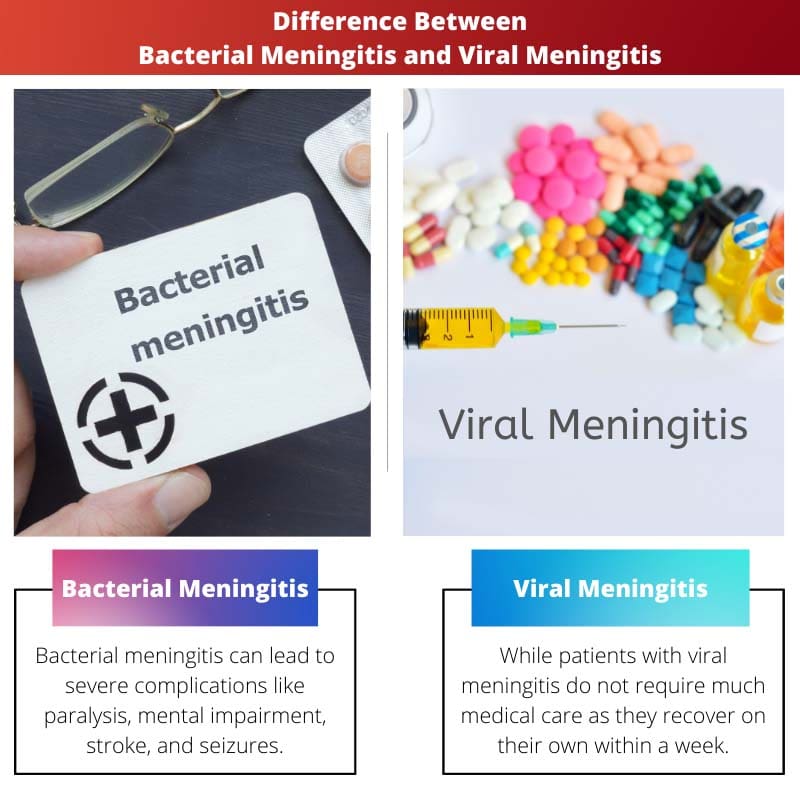Meningitis is referred to the infection of the membranes of the brain and the spinal cord. The membranes are called meninges. It can be acute and mild to deadly depending upon the duration of onset and severity of the condition.
The two major types of meningitis are bacterial meningitis and viral meningitis.
Key Takeaways
- Bacterial meningitis is a severe infection of the protective membranes surrounding the brain and spinal cord caused by various bacteria and can be life-threatening if left untreated.
- Viral meningitis is a milder form of meningitis caused by viruses, less severe, and resolves independently without specific treatment.
- Although both types of meningitis exhibit similar symptoms, bacterial meningitis requires immediate medical attention, while viral meningitis may not.
Bacterial Meningitis vs Viral Meningitis
Bacterial meningitis is an infection caused by bacteria such as Streptococcus pneumoniae. It can have severe symptoms, such as fever, confusion, seizures, etc. Viral meningitis is an infection caused by a virus, such as enterovirus. Symptoms can include fever, headache, stiff neck, etc.

Bacterial meningitis can lead to severe complications like paralysis, mental impairment, stroke, and seizures. There are two widely used vaccines to protect against bacterial meningitis.
The levels of white blood cells and protein are higher in bacterial meningitis, while the levels of glucose are quite low.
Patients with viral meningitis do not require much medical care as they recover on their own within a week. They do not lead to any serious complications. There are several kinds of viruses that can cause viral meningitis.
Comparison Table
| Parameters of Comparison | Bacterial Meningitis | Viral Meningitis |
|---|---|---|
| Cause | Head injury, infection, history of spinal or brain surgery, blood infection, alcohol consumption, ear or nose infections, or weak immune system | From viruses like non-polio enteroviruses, mumps virus, influenza virus, arboviruses, measles virus |
| Symptoms | Fever, drowsiness, confusion, vomiting, irritability, headache, stiffness in the neck | Lack of appetite, lethargy, weakness, insomnia, stiff neck, nausea, photophobia |
| Diagnosis | Stiffness of the neck, flexion of hip and knee is checked, spinal fluid, blood, urine, and mucous from the nose and throat is analyzed | Analysis of stool and urine sample, swabbing the nose and the throat, blood test and through a spinal tap |
| Treatment | General intravenous antibiotics with corticosteroids are prescribed | Antiviral medications |
| Prevention | By taking vaccines like Meningococcal conjugate (MenACWY) and Serogroup B Meningococcal (MenB) vaccine and maintain distance from similar kinds of patients | There are no vaccines against viral meningitis. However, maintaining distance from other patients and ensuring enough cleanliness and sanitization can be helpful |
What is Bacterial Meningitis?
Bacterial meningitis is a rare yet serious type of meningitis. In bacterial meningitis, the tissues of the brain swell, which hinders blood flow.
Most of the cases of bacterial meningitis are acute but can lead to serious complications, too like paralysis or even stroke. It can be determined by tests like a spinal tap or analysis of the urine, blood, or mucous of the throat and nose.
The most susceptible age group to bacterial meningitis is small children of 1 month to 3 years of age. The main cause of bacterial meningitis is not found but people with a previous head injury, infection, history of spinal or brain surgery, blood infection, alcohol consumption, ear or nose infections, or weak immune system have developed bacterial meningitis.
Some common symptoms of bacterial meningitis are headache, fever, vomiting, irritability, and confusion. Bacterial meningitis at a primitive stage can be cured.
The doctors prescribe requisite antibiotics after evaluation of the symptoms and determine the type. Patients are advised to replenish the fluids lost through proper diet and hydration.
Bacterial meningitis grows rapidly. It is essential to visit a doctor or a specialist immediately if any such symptoms arise. Most people at early stars recover, but around 10% of the total patients with meningitis die.
It can also cause permanent damage like mental impairment or seizures.

What is Viral Meningitis?
Viral meningitis is the type of meningitis caused by the virus. The viruses that are responsible for causing viral meningitis are non-polio enteroviruses, several kinds of herpesviruses, mumps virus, influenza virus, arboviruses, measles virus, and other lymphocytic choriomeningitis viruses.
Viral meningitis is a curable disease, and the patients recover within 1-2 weeks.
The most susceptible age group is that of younger babies or people with a previous medical history of diseases, infections, or surgeries and hence have weak immunity.
The common symptoms of viral meningitis are fever, lack of appetite, lethargy, weakness, irritability, insomnia, stiff neck, nausea, vomiting, photophobia, and others.
Most of the initial symptoms of viral meningitis are common to bacterial meningitis and sepsis. So, it is essential to visit a doctor immediately if any similar symptoms arise to detect the type by a specialist.
Doctors diagnose viral meningitis by carrying out tests like analysis of stool and urine samples, swabbing the nose and the throat, blood tests, and through a spinal tap (drawing fluid from the spinal cord).
Since viral meningitis is curable and most people recover from it, there is no absolute and specific treatment for the same. Doctors prescribe antiviral medications to beat viral meningitis.
It is essential to ensure proper protection by maintaining enough distance from similar patients, washing or sanitizing hands regularly, and disinfecting commonly touched surfaces. Ensure a clean home that is free from mice and rats and avoid bites of any insects.

Main Differences Between Bacterial Meningitis and Viral Meningitis
- Bacterial meningitis does not resolve by itself and requires treatment, while viral meningitis resolves by itself without treatment.
- Bacterial meningitis can lead to several complications like paralysis, stroke, mental impairment, or seizures, while viral meningitis in most cases, does not cause any complications.
- In the case of bacterial meningitis, intravenous antibiotics with corticosteroids and vaccines are prescribed, while viral meningitis resolves within 1-2 weeks with some antiviral medications.
- Bacterial meningitis is a rare and serious type of meningitis, but viral meningitis is the most common type of meningitis and is easily curable.
- The levels of white cells and protein are higher in bacterial meningitis, while the level of glucose is higher in viral meningitis.

- https://journals.lww.com/pidj/FullText/2004/06000/Differentiating_Acute_Bacterial_Meningitis_From.6.aspx
- https://academic.oup.com/cid/article-abstract/24/6/1240/339164

Very informational post on Meningitis. I appreciate the breakdown of differences between viral and bacterial meningitis and their respective symptoms.
I agree! This article provides a comprehensive explanation of the condition and its types.
The detailed focus on the distinct characteristics of bacterial and viral meningitis offers valuable insights into the conditions. It’s a well-documented piece that provides a clear understanding.
I appreciate the comprehensive comparison of bacterial and viral meningitis. The post addresses crucial differences and symptoms that are essential for identifying and treating the respective conditions.
I found this post to be highly educational, and the specific emphasis on the susceptibility and symptoms of both bacterial and viral meningitis is particularly enlightening.
This article is a great resource for understanding the causes, symptoms, and treatments of bacterial and viral meningitis. It’s presented in a clear and concise manner.
The detailed description of the causes, symptoms, and treatments for bacterial and viral meningitis offers valuable insights into these health conditions. It’s an informative and enlightening piece of content.
I’ve always been curious about the differences between bacterial and viral meningitis. Great article that provides an in-depth analysis of both and how they are diagnosed and treated.
The comparison table is very helpful in understanding the differences between bacterial and viral meningitis. It’s useful to know the distinct symptoms and diagnostic methods for each type.
Agreed, the detailed comparison between bacterial and viral meningitis is presented in a comprehensive manner. It provides clarity on the different aspects of each type.
Understanding the key differences between bacterial and viral meningitis is important, and this post excels in providing a detailed comparison of the conditions and their respective implications.
Absolutely, the post presents a well-researched and informative breakdown of the symptoms, causes, and treatments for bacterial and viral meningitis, making it an excellent resource for raising awareness on the topic.
Informative article! It’s crucial to understand the differences between bacterial and viral meningitis, especially in recognizing the symptoms and seeking medical attention accordingly.
Absolutely, understanding the contrasting nature of bacterial and viral meningitis helps in differentiating the two and recognizing the level of urgency in seeking medical care.